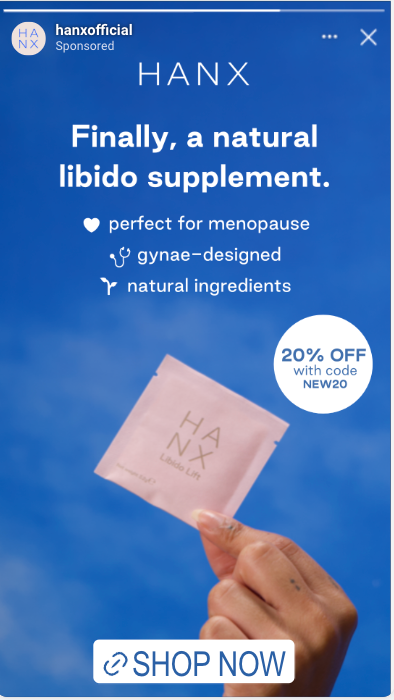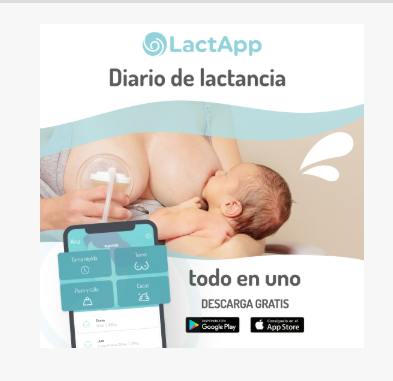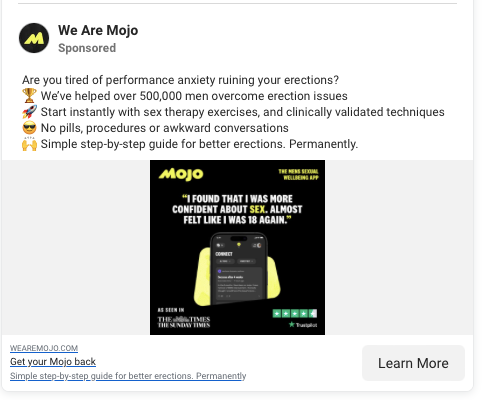
Online platforms are blocking posts and adverts about women’s health while allowing posts about erectile dysfunction, it has been claimed.
A group of femtech companies – businesses involved in technology products addressing women’s health and wellbeing issues – have accused Meta, which owns Facebook and Instagram, along with LinkedIn, Google and Amazon, of “systemic bias and discrimination” against women’s health content.
They said the platforms have given “vague and inconsistent” reasons for repeatedly blocking, removing and restricting content about women’s health, including posts on menopause, endometriosis and infertility.
This week, six UK and European companies have issued formal complaints about the platforms to the European Commission, which regulates social media sites and search engines under the Digital Services Act.

They have requested it investigates the platforms’ moderation polices – which they say appear to be “biased” against women – and find out why women’s health content is being removed or restricted.
“We have evidence [of] multiple cases where medically accurate, expert-led content has been blocked or labelled as ‘adult content’ or ‘political’,” said co-founders of the anti-censorship campaign group CensHERship, Clio Wood and Anna O’Sullivan.
“We can’t improve women’s health if we can’t talk about our bodies using anatomically-correct language.”
In one example, a company which makes lubricants for women struggling with painful sex had its educational posts on endometriosis, postnatal recovery and vaginal health removed from LinkedIn for promoting “illegal products and services”.
A breastfeeding support app had ads restricted by Instagram because they showed an image of a baby breastfeeding. It was also not allowed to use the word “nipple” in educational posts.

And although Meta classes erectile dysfunction as a health condition and allows adverts for treatments, it has repeatedly blocked adverts and posts about a product which helps boost women’s libido, citing its policy which bans promotion of “sexual pleasure or enhancement”.
One advert that was restricted under this policy stated: “Finally, a natural libido supplement… Perfect for menopause, gynae-designed, natural supplement.”
Yet an advert for a male libido treatment was allowed, which stated: “Are you tired of performance anxiety ruining your erections? We’ve helped over 500,000 men overcome erection issues… ‘I found that I was more confident about sex. Almost like I was 18 again.’”
Company Bea Fertility, which sells at-home fertility testing kits, said it tried to post diagrams and guides to using its products on its Amazon store page, but these were rejected because they contained the word “vagina” – although the word “semen” was allowed.
The graphics, which have been seen by The Independent, included practical medical advice such as: “It isn’t safe for you to use [the product] if… you have had vaginal/cervical surgery within the last three months.”
These were automatically rejected, with the reason given being: “These keywords violate our community guidelines: vagina.”
The action has been organised by CensHERship and women-focused investment group The Case For Her, with companies involved including Bea Fertility, vaginal health brand Aquafit Intimate, the sexual health and wellbeing platforms Geen and HANX, breastfeeding support app Lactapp, and sustainable period care brand Daye.
They are calling on the platforms to implement “clear, non-discriminatory advertising guidelines that protect, rather than silence women’s health conversations”.

Cristina Ljungberg, co-founder of The Case For Her, said: “When femtech companies face digital suppression and censorship by the big tech platforms, they struggle to reach customers, limiting their ability to advertise and generate revenue.”
She warned that this not only restricted women’s access to health products and services but put off investors funding research and innovation into women’s health.
Amazon said it had not taken action against the Bea Fertility store or products over its use of the word “vagina”. It said there were multiple products whose titles contained the word sold through its site.
A LinkedIn spokesperson said: “Our policies outline what is and isn’t allowed. Educational or awareness-related content on health topics is allowed on LinkedIn, as long as it does not promote specific products or services. If an author believes their content has been removed in error, they have the option to appeal and we’ll take a second look.”
Meta and Google did not respond to requests for comment.
Which US companies are pulling back on diversity initiatives?
Potassium mining project in Brazil’s Amazon rainforest divides Indigenous tribe
‘Economic blackout’ boycott will target Amazon, Twitch and Whole Foods
Negotiators appeal to man to come down from Big Ben clock tower
Man with Palestinian flag climbs Big Ben’s Elizabeth Tower
Keir Starmer shares message to daughter on International Women’s Day







